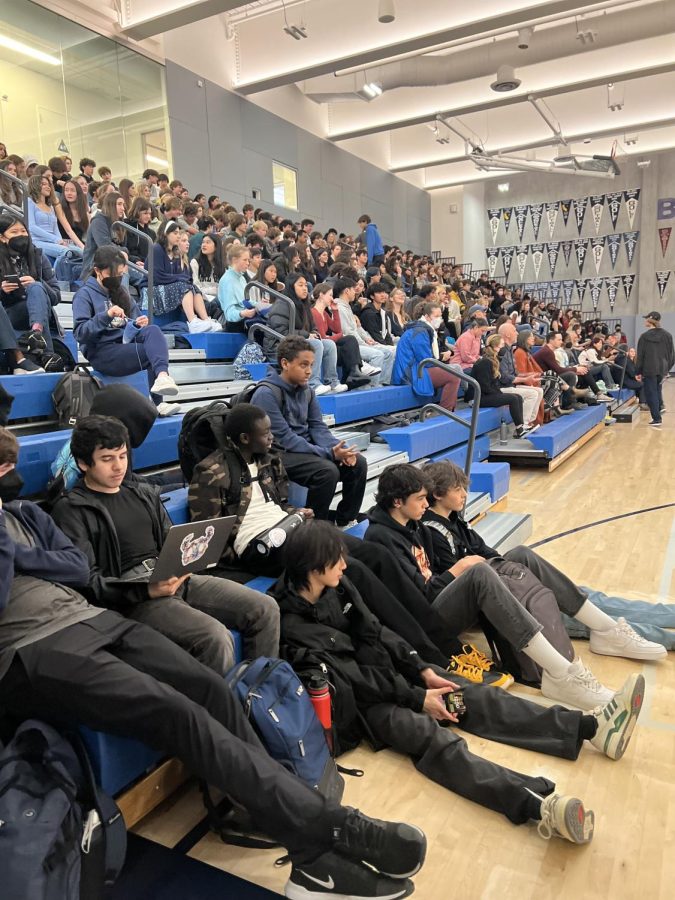Opinion: Why you should attend ASM
Although All School Meetings (ASMs) are supposed to have the entire student body in attendance, the stands are always sparse. Yes, listening to the newest COVID policies is not so tempting, but these announcements are also important to know. Furthermore, when students arrive late to events like the LatinX History Month presentation, it is not only disrespectful to teachers, but also to their fellow students presenting. This is all to say: do not come late or skip ASM. It is worth it to listen to administrative details if that means promoting a larger sense of unity at Urban.
ASMs are generally enjoyable to attend — who does not enjoy spending an hour of their time watching an all-sports competition or the Urban Cowboy winning the Halloween costume contest? ASMs often attempt to increase student morale, but during the highly logistical announcements, even I lose attention.
Despite the many ASMs that are presented by students, the initial planning is often done by adults — namely the grade deans, Assistant Head for Student Life, Academic Dean, the head of MultiCulti and the Dean of Student Activities. The plans are then brought down to the student groups such as the Student Committee (StuCo) and MultiCulti.
“The ASMs aren’t [run by StuCo], except for the allotted student-run ASM [every trimester],” said August Starr ‘23, StuCo co-president. “They’re not even [organized by] Max or me, they’re pretty much organized by Skyler and Charlotte.”
Although I realize adults plan ASMs for the purpose of fulfilling various needs through these meetings, and I have no doubts about the capabilities of our deans, this left me wondering if that lack of student involvement is correlated to the lack of student incentive to attend ASMs. Perhaps incorporating student input in the process would lead to increased student engagement.
In addition to a disconnect between ASMs and student input, students have expressed a desire to skip ASMs because they feel that time could be more efficiently spent. “Usually I decide to skip because it feels like it’s kind of a waste of time because I live far away and I have a job after school. So getting homework done is a priority,” said Ally Waters ‘23.
However, while some students can receive information via email or a Schoology post, this is not always the case for everyone. “Most people are multimodal learners. Many students never look at their email. So there’s some students and adults for whom email is a really great means of communication,” said Charlotte Worsley, assistant head for student life. “So as you’re trying to communicate to an entire school, you’re always thinking about all the different ways you need to communicate.”
Many students are not aware of the important issues and events that are addressed at ASMs. “If someone’s coming out to speak, we’re not notified about it, so I don’t know what’s happening,” said Waters.
Waters also noted that when they regret skipping, they often hear through their friends that a speaker came in but did not know about it. “[I think], ‘That’s so rude and disrespectful, I should have gone,’” said Waters. Students similar to Waters do not want to attend ASMs that could be summarized in an email — but rather those that are best presented live: guest speakers, StuCo events and MultiCulti ASMs.
This skipping culture is perpetuated throughout the student body and continues through their efforts, especially among juniors and seniors. This is not a school spirit article by any means, but I believe fostering a closer community is something that ASMs can accomplish. However, an ASM’s ability to do this completely depends on student participation. Students, you only have a certain amount of time at Urban, and what you put into these events is often what you get out of them.
“Show that you’re a part of the community and making the most out of your time at Urban,” said Starr. “You might hear about an opportunity or it might just be fun. But they’re not just lectures, they’re purposeful.”


